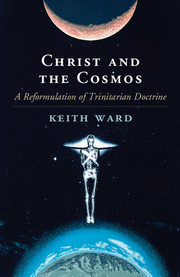Book contents
- Frontmatter
- Contents
- Preface
- Acknowledgements
- PART I THE THREEFOLD NATURE OF THE DIVINE BEING
- PART II THE BIBLICAL SOURCES OF TRINITARIAN THOUGHT
- 6 Three Centres of Consciousness?
- 7 The Synoptic Gospels
- 8 John's Gospel
- 9 The Trinity in the Epistles
- 10 The Idea of Incarnation
- PART III THE TRINITY, IMMANENT AND ECONOMIC
- PART IV THE SOCIAL TRINITY
- PART V THE COSMIC TRINITY
- Bibliography
- Subject Index
- Name Index
6 - Three Centres of Consciousness?
from PART II - THE BIBLICAL SOURCES OF TRINITARIAN THOUGHT
Published online by Cambridge University Press: 05 September 2015
- Frontmatter
- Contents
- Preface
- Acknowledgements
- PART I THE THREEFOLD NATURE OF THE DIVINE BEING
- PART II THE BIBLICAL SOURCES OF TRINITARIAN THOUGHT
- 6 Three Centres of Consciousness?
- 7 The Synoptic Gospels
- 8 John's Gospel
- 9 The Trinity in the Epistles
- 10 The Idea of Incarnation
- PART III THE TRINITY, IMMANENT AND ECONOMIC
- PART IV THE SOCIAL TRINITY
- PART V THE COSMIC TRINITY
- Bibliography
- Subject Index
- Name Index
Summary
The Christian doctrine of the Trinity does not have its main source in relatively abstract philosophical considerations, though its various formulations have been influenced by them. What chiefly generates the Christian view is reflection on the person of Jesus and his relation to the creator God. It is in the New Testament that the main material for such reflection is to be found, and it is to it that one must look for the earliest written sources of Christian beliefs about Jesus.
It is generally agreed that the New Testament does not contain a clear statement that God is a Trinity, certainly not in the sense that came to be defined in fourth- and fifth-century councils of the Church. Nowhere in the Gospels can we find a statement that God is three persons in one substance, all co-eternal and co-equal, and that Jesus is in some sense identical with one of them. Tertullian is generally taken to be the originator of the expression ‘three persons in one substance’ – una substantia, tres personae. Jesus never said, ‘I am the second person of a co-eternal and co-equal Trinity’, so this has to be taken as a later attempt to work out what was only implicit in Jesus’ teachings and acts.
Nevertheless, some theologians find evidence of three distinct individuals, who are all divine (three subjects of consciousness and will – Father, Son, and Spirit), in the Gospels. This is by no means an absurd suggestion. Indeed, it has much to commend it. Jurgen Moltmann points out that Jesus, as recorded in the Synoptic Gospels, usually refers to God as his ‘father’. This already makes a distinction between God the Father and Jesus. They are obviously not the same thing. Jesus prays to the Father, and he is not just praying to himself. In John's Gospel, Jesus says that ‘I came from the Father … and am going to the Father’ (John 16, 28). He prays, ‘Father, the hour has come; glorify your Son’ (John 17, 1). The Father ‘sends’ his Son into the world, and Jesus says, ‘The Father is greater than I’ (John 14, 28), which seems to emphasise the difference between Father and Son. In the Synoptic Gospels, too, a distinction is made between Jesus and the Father. At Jesus’ baptism, a voice from heaven says, ‘This is my beloved Son’ (Mark 9, 7).
- Type
- Chapter
- Information
- Christ and the CosmosA Reformulation of Trinitarian Doctrine, pp. 33 - 42Publisher: Cambridge University PressPrint publication year: 2015



